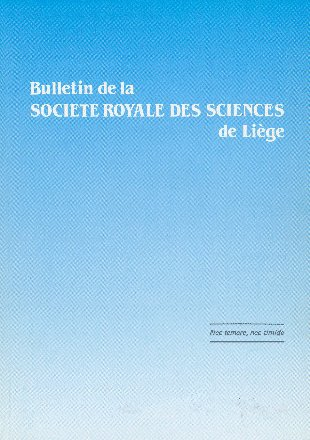- Accueil
- Volume 78 - Année 2009
- RÔLE DE LA DENSITÉ PARASITAIRE INITIALE SUR LA SENSIBILITÉ À LA CHLOROQUINE DES ISOLATS DE PLASMODIUM FALCIPARUM EN CULTURE IN VITRO
Visualisation(s): 4471 (28 ULiège)
Téléchargement(s): 1890 (26 ULiège)
RÔLE DE LA DENSITÉ PARASITAIRE INITIALE SUR LA SENSIBILITÉ À LA CHLOROQUINE DES ISOLATS DE PLASMODIUM FALCIPARUM EN CULTURE IN VITRO

Résumé
Cette étude a porté sur huit isolats de Plasmodium falciparum de densité parasitaire initiale (DPi) inférieure ou supérieure à 8000 GRP/µl), mis en culture in vitro selon la variante isotopique du microtest OMS en présence d’un antipaludique de référence, la chloroquine. Les résultats de cette étude ont permis de mettre en évidence deux isolats CQ-S (25%) contre six isolats CQ-R (75%). En considérant la répartition de la population des isolats par rapport à la DPi, il a été obtenu parmi les cinq isolats de DPi > 8000 GRP/µl (0,2%), quatre isolats de phénotype résistant (80%) contre un isolat de phénotype sensible (20%). Par contre, parmi les trois isolats de DPi compris entre 4000 (0,1%) et 8000 GRP/µl (0,2%), l’un d’entre eux était CQ-S (33%) pour deux isolats CQ-R (67%). En définitive, un test Kappa a permis de conclure qu’il n’existe pas de corrélation entre la charge parasitaire initiale et le phénotype des isolats de P. falciparum (kappa = 0,14), malgré le nombre relativement faible d’isolat mis en culture.
Abstract
This survey carried on eight isolates of Plasmodium falciparum whose initial parasites density (iPD) was lower or superior to 8000 GRP/µls (0.2%) and put in in vitro culture according to the isotopic variable of OMS microtest in presence of a reference antimalarial drug (chloroquine). The results of this study permitted to get two CQ-S isolates (25%) against six CQ-R isolates (75%). While considering the distribution of the population of P. falciparum malaria isolates in relation to the iPD, it was obtaines among the five isolates which iPD > 8000 GRP/µl (0.2%), four phenotype resistant isolates (80%) against one sensitive isolate (20%). On the other hand, among the three isolates which an iPD lower than 8000 RBC/µl (0.2%), one among them was CQ-S (33%) for two CQ-R isolates (67%). Finally, a Kappa test permitted to conclude that it doesn't exist any relationship between the initial parasites density and the phenotype of P. falciparum isolates (kappa =0.14), in spite of the relatively weak number of P. falciparum malaria isolates
Pour citer cet article
A propos de : KIPRE Gueyraud Rolland
Laboratoire de Pharmacodynamie-biochimique, UFR Biosciences, Université de Cocody-Abidjan, 22 BP 582 Abidjan 22, Côte d’Ivoire, Tél : 06 09 70 01 91 et 26 rue du Jet d’eau, F-13003 Marseille, France, kip_rolland@yahoo.fr
A propos de : GUEDE-GUINA Frédéric
Laboratoire de Pharmacodynamie-biochimique, UFR Biosciences, Université de Cocody-Abidjan, 22 BP 582 Abidjan 22, Côte d’Ivoire
A propos de : DEPOIX Delphine
USM 0504"Biologie fonctionnelle des protozoaires" EA 3335 Département "Régulation, Développement, Diversité Moléculaire" Muséum National d’Histoire Naturelle, Case Postale 52. 61 rue Buffon, F-75231 Paris Cedex 05, France
A propos de : GRELLIER Philippe
USM 0504"Biologie fonctionnelle des protozoaires" EA 3335 Département "Régulation, Développement, Diversité Moléculaire" Muséum National d’Histoire Naturelle, Case Postale 52. 61 rue Buffon, F-75231 Paris Cedex 05, France
A propos de : DJAMAN Allico Joseph
Laboratoire de Pharmacodynamie-biochimique, UFR Biosciences, Université de Cocody-Abidjan, 22 BP 582 Abidjan 22, Côte d’Ivoire et Laboratoire de biochimie, Institut Pasteur de Côte d’Ivoire, BP V 490, Abidjan.






